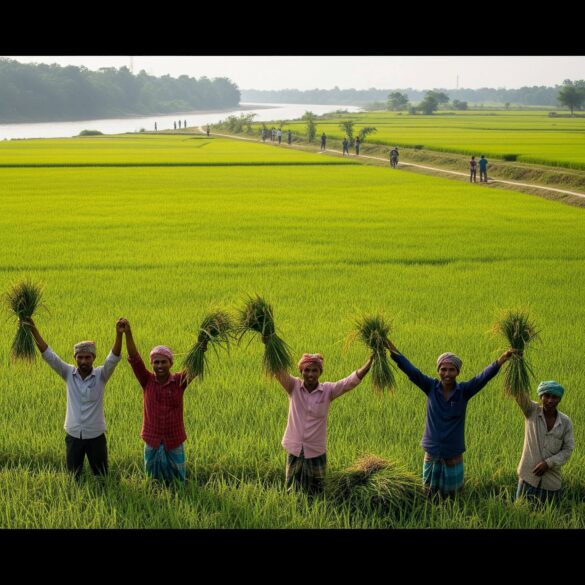Bangladesh’s largest irrigation scheme, the Teesta Irrigation Project, is once again proving to be a cornerstone of the country’s agricultural strength. This year’s Boro paddy season has seen a record-breaking harvest across the northern Rangpur region, a success attributed largely to the steady water flow delivered by this vast project. Built around the Teesta Barrage in Hatibandha upazila of Lalmonirhat, the project has been operational since 1992. It channels water from the Teesta River through an extensive canal system that irrigates farmland across six northern districts—Rangpur, Nilphamari, Gaibandha, Dinajpur, Joypurhat, and Bogura. This infrastructure has become essential for nearly one lakh farmers, who now rely on it for their seasonal cultivation. This year, farmers have reported an average increase of two tonnes of Boro paddy per hectare, a dramatic improvement over previous yields. The reliability of surface water irrigation through the Teesta system offers major advantages over costlier groundwater methods. In fact, those using the Teesta supply saw their production costs drop by nearly 30 to 35 percent. This has helped many small-scale farmers, like Ataur Rahman and Soleman Mia, increase their profit margins while reducing dependence on chemical inputs. The river water, rich in natural silt, enhances soil fertility and minimizes the need for added fertilizers and pesticides. The current coverage area of the Teesta Irrigation Project spans 55,000 hectares. This season alone, it helped produce about 4.40 lakh tonnes of Boro paddy, reinforcing its role in national food security. Encouraged by this success, the government is now actively pursuing plans to extend the reach of this critical infrastructure. Ongoing efforts include the dredging and rehabilitation of approximately 375 kilometers of the canal system—half of the total 750 kilometers. These upgrades aim to increase irrigation coverage to 100,000 hectares by next year. If successful, this expansion could directly benefit around two lakh farmers, doubling the current impact of the project. Long-term strategies are also being developed to bring even more land under the irrigation network, ensuring more consistent water supply in regions vulnerable to drought and groundwater depletion. This latest success underscores the importance of investing in resilient agricultural infrastructure. As Bangladesh faces challenges such as climate variability and land pressure, projects like Teesta serve as examples of sustainable development that delivers measurable benefits. The increased yields, reduced costs, and improved livelihoods seen this season are not isolated outcomes—they are signs of what strategic planning and public investment can achieve when aligned with the needs of rural communities.
Teesta Irrigation Project Powers Bumper Boro Harvests and Farmer Prosperity
53


